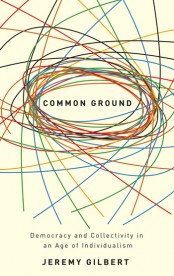The common, our social relations, are collectively produced but privately consumed. Is there a way out of this neoliberal trap?
Full disclosure: I met Jeremy Gilbert at a Deleuze conference in Wales in the summer of 2008. He gave an interesting paper on Deleuze, Guattari, and Gramsci, and I ended up talking to him at a pub. The conversation was one of shared interests that went beyond Deleuze (it was a Deleuze conference after all) to include Simondon, transindividuality, and the broader problem of reimagining collectivity in individualistic — and individuated — times. As anyone in academia knows, the experience of meeting someone with a shared interest is often ambivalent. There is the joy of finding someone to talk to, of feeling less alone in the academic wilds, coupled with the sadness of feeling less original, less insightful. The latter feeling is, of course, intensified by a publishing culture predicated less on collective projects and more on developing a name for oneself. In the years since then, as our projects progressed (his made it to print first), we joked about constituting a new school of thought, Transindividual Ontology and Politics (TOP).
 Common Ground: Democracy and Collectivity in an Age of Individualism
Common Ground: Democracy and Collectivity in an Age of Individualism272 pages
Jeremy Gilbert
Pluto Press
In Common Ground, Gilbert address this question from the outset by confronting the particular paradox of neoliberalism: how it attempts to realize an ideal of “individuals acting in terms of their own competitive interests” while simultaneously trying to naturalize it at the level of not just theory but common sense. Its ideal of an individualistic, apolitical idea of society itself requires a political project. It asserts that competitive self-interest is inherent even as institutions are reorganized not just to reflect that inherentness but to actively produce competition. Neoliberalism functions as a set of institutional and political transformations that compels people to adopt its worldview. The parents sending their children to a charter school in place of underfunded public schools, or the college student trying to figure out the best major to go into debt to study, may not believe in the ideal of competitive individuals or market relations as the best model of social relations, but they are compelled to act as if they do just to survive. Or, as in the example I began with, think of how the casualization and precaritization of the academic job market make it so that even those who study transindividuality are less likely to share research, manuscripts, and so on. Neoliberalism destroys the conditions for collective action and collective decisions.
Gilbert’s brief history of neoliberalism offers two significant qualifications of this standard paradox. First, he points out that as much as neoliberalism presents a society made up of isolated competitive relations as its ideal and goal, it required at its inception a “populist” political project. Thatcher’s imposition of neoliberalism depended on an image of honest, hardworking individuals who were being taken advantage of by unions and other special interests. It may be that every appeal to market rationality relies on a populist division between the rational, competitive, and autonomous individuals who make up the nation, and the various deviant and dependent collectives that distort it.
Does neoliberalist market rationality, then, require a nationalist or even racist supplement? The axioms of neoliberalism depend on not just the codes of nation, race, and gender but also a particular affective tenor of “negative solidarity”— the weak bond orienting isolated and competitive individuals against those who are failing to work or bear their share of austerity.
Second, Gilbert argues that the political and economic project of neoliberalism reveals the extent to which prior economic projects were political (and vice versa). On this reading, Fordism is not just a technological reorganization of production or an economic reorganization of accumulation, but the material conditions for a “culture of shared experience and collective agency” that made possible a certain ideal of democracy. Gilbert doesn’t flesh this point out, but as with his point about populism, it suggests a move beyond the separation of politics and economics to engage their real intersection.
Neoliberalism can thus be understood as a particular intersection in which politics, or democratic politics, is increasingly undermined by an economics of competition. As Gilbert argues:
Neoliberal culture works specifically to enhance our creative capacities while inhibiting any attempt to put them to work in a collective, political, democratic fashion: almost by definition, this makes meetings — in workplaces, communities, political organizations or civil society bodies — tendentially impotent and hence frustrating, compared to the sense of agency we are permitted to experience daily as individual consumers and labor-market competitors.
Neoliberalism depoliticizes not just by offering a series of market-based solutions to political problems — private schools, gated communities, and even organic produce — but by making politics itself appear repulsive and stifling compared with the energy of the market.
Gilbert is not just interested in neoliberalism’s paradoxical politics of apoliticality. His engagement with the “age of individualism” also includes an examination of theoretical representations of collectivity that attempt to escape these paradoxes. For this, Gilbert theorizes an abstract machine of social relations that he calls “Leviathan logic.” This logic is drawn from Hobbes, but as an abstract machine, it is present anywhere society is conceived as a set of vertical relations between individuals and a ruler or ruling idea (in Hobbes’s case, the sovereign). Hobbes argued that in a state of nature, without any state or authority, the life of mankind would be “nasty, brutish, and short” as individuals came into constant conflict for survival. Hobbes's state of nature is even worse than our contemporary horrors of the postapocalyptic wasteland — after those apocalypses, people at least form roving gangs. What makes Hobbes’ logic a “Leviathan logic” is his assertion that the only condition of any unity, any organization, is the establishment of a sovereign, a state that can keep mankind’s antisocial tendencies in check.
While it is common to read Hobbes’s Leviathan as the foundational text of individualistic political ontology, Gilbert demonstrates that such a logic also defines such texts as Freud’s Group Psychology and the Analysis of the Ego as well as Ernesto Laclau’s work on populism and politics. Leviathan logic is less a particular theoretical position than a tendency to see the individual as rational, working for his or her interest, and the collective as inherently irrational. It’s at work anytime society, collectives, or crowds are understood to be unified only by their relation to some leader or ideal, a vertical relation that provides the only way a group or collective can have any direction or purpose. Foreclosed by this logic is any crowd or collective that is articulated through lateral relations — or, in short, a nonfascist philosophy of collectivity.
The second half of Gilbert’s book is concerned with the conditions of theorizing a nonfascist crowd, or a thought of collectivity irreducible to either the individual or the masses conceived as a meta-individual, with the leader as its head. Gilbert turns to Spinoza, Simondon, Deleuze, Guattari, Derrida, Hardt, and Negri to theorize this, arguing that in each there is a thought of the reality of relations that exceed the divide between the individual and society. Gilbert draws on Spinoza’s account of “affect,” Simondon’s “preindividual,” Deleuze and Guattari’s idea of becoming, Jean-Luc Nancy’s “being singular plural,” and even Derrida’s “infinite relationality” to develop an ontology of relations. Gilbert’s remarks on these points are suggestive, overcoming not just the divides between these thinkers but also the ways in which they’ve been read though the interpretive lens of individuality. (This is particularly true of Derrida, who has been read as a solipsistic or even nihilist figure.) Gilbert synthesizes these different thoughts of relationality to propose the concept of a “mode of relation” as an avenue for future inquiry, a way of thinking the different articulations and limitations of relations in each historical and political period.
While Gilbert’s survey of various relational figures has the merit of bringing some obscure thinkers (particularly Simondon) to light and offering new readings of philosophers (specifically Derrida) not usually seen as proposing a new thought of relations, it does not adequately address some of the real differences between these theorists. However, articulating a relational account of politics is so daunting that it might be enough to only draw the lines along which such a project could be developed. A truly relational account of transindividuality would not be a group of writers and philosophers unified through a common idea or philosopher, but a group of more or less intersecting problems and relations.
I would like to conclude by picking up one of the themes from these intersections of problems, his critique of Hardt and Negri. The problem with Hardt and Negri is not that their concept of the multitude — the immanent and horizontal relations that produce and reproduce social relations — carries with it some remnant of Leviathan logic. Hardt and Negri’s idea of the multitude is thoroughly horizontal, immanent, without any organizing figure or ideal of transcendence. The problem is that the ontological primacy of the multitude, or the common, is too easily taken as its political potency. As Gilbert writes,
If we look at 21st century, but see only the Internet, globalization, and the growth of great cosmopolitan cities — ignoring the sociocultural consequences of neoliberalism and its success at inhibiting the growth of potent collectivities — then it is easy to be convinced that the communist millennium is near at hand.
This statement could be understood as another critique of Hardt and Negri’s optimism, but it raises questions of the ontology and politics of individuation. Hardt and Negri are content to combine an ontological primacy of collectivity, the basic idea that our language, habits, and ideas are collectively produced and circulated, with the history of certain economic and technological changes — the rise of communication in production — to arrive at a political conclusion that the multitude is a political reality. In doing so, they overlook the extent to which the present is defined as much by practices of individuation as the production of the common.
As much as the isolation and depoliticization of neoliberal individuation must be criticized, it is still necessary to understand this individuation as real, with real effects. It is our particular mode of relation, our way of living even those transformations of the common that Hardt and Negri celebrate. We might be all involved in a collective production of the common, but that does not mean that this common is just appropriated privately by capital. It is also experienced privately through the commodity form. Appropriation of the common does not just take place at the level of corporations that profit off of the immense surplus of communication and cooperation, but it also takes place in our daily experience of the common.
The common world, the world of shared ideas and experiences, is lived in our own homes and on our own personal screens. This private consumption of the common is part of the neoliberal “mode of relations,” especially since it turns our attention away from the social connections that we form and toward the commodities and brands that make such connections possible. The common, our social relations, are collectively produced but privately consumed. The task of a philosophy of relation, of a transindividual philosophy, is not just to assert the reality of relations but also to understand how those very relations individuate us. Gilbert’s idea of a mode of relation, and his book in general, is an important contribution to such a project.

